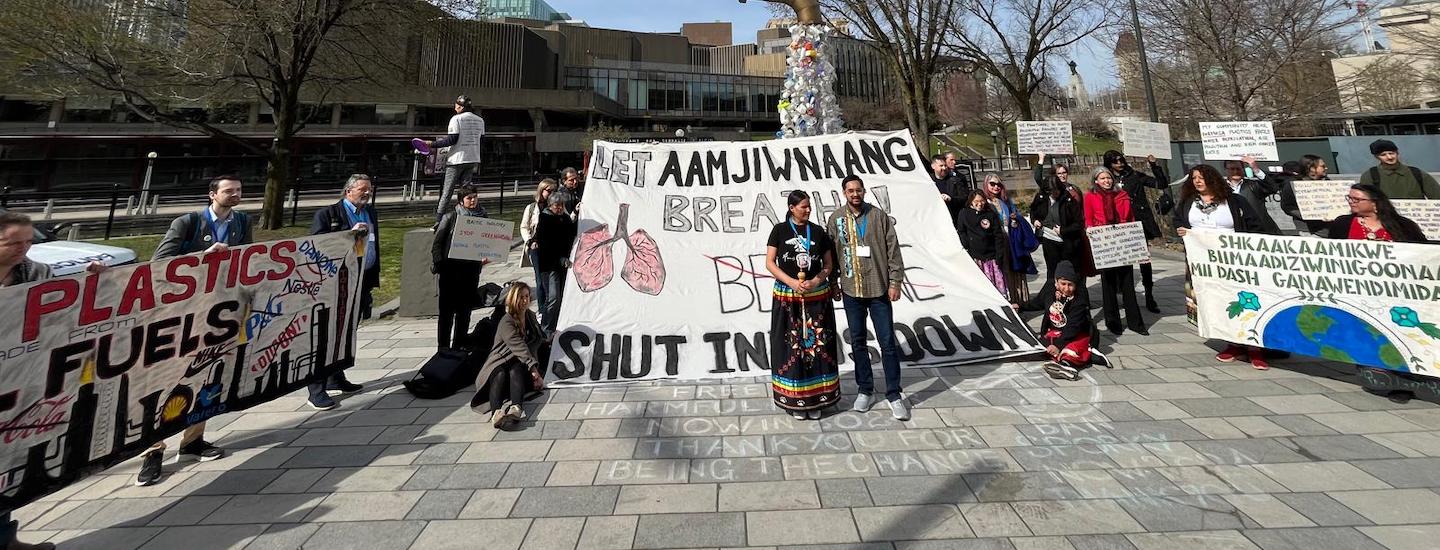
Surfrider activist Lucy Drummond joined us in Ottawa, Canada for the United Nations' fourth Intergovernmental Negotiation Committee (INC-4) meeting on the Global Plastics Treaty.

What is your connection to Surfrider?
I like to think I am a part of the larger Surfrider family. I initially connected with Surfrider because of its ambitious work around plastics in oceans and beaches, and Surfrider’s support of decreasing production of single use plastics. I’ve grown enamored and inspired by the activists who work at Surfrider.
What prompted you to consider attending the Global Plastics Treaty negotiations (INC-4) in Ottawa?
I attended the Global Plastics Treaty negotiations in Ottawa (INC-4) because I am fascinated by how procedural justice, or how the input of those most affected by plastic pollution throughout all stages of its life cycle, is either delivered or denied by the UN process. The convenience and ease of plastics mask their true impact–which is enormous in terms of health, emotional, and spiritual wellbeing for frontline, fenceline, and Indigenous communities across the entire life cycle of plastic.
If the UN plastics treaty does not deliver justice to the communities most in need, which tragically seems more and more likely, I am curious if the community building of the Plastics Coalition can offer some consolation by connecting the people who are fighting plastic injustice, and creating spaces where the vision of a more just future can come to life.
What about INC-4 surprised you?
I was surprised by how spirited and poised so many people who are affected by the unjust impacts of plastic pollution were in these negotiations. I would see people representing fenceline, frontline, and Indigenous communities cry during testimonies and press statements, expressing the violence their communities were suffering from plastic. I would then see these same people laughing joyously with their friends, creating hilarious memes about the laborious negotiations, or generously consenting to be interviewed for my work.
The more I think about this, the more it actually makes sense. These people, who are fighting for their and their communities’ lives, are living in truth. They are facing horrendous violence, and that violence is deliberately denied or obfuscated by the plastics industry and the governments of fossil fuel countries. But these activists fight through those lies and obfuscation, showing up for, speaking about, and fighting against plastic’s nefarious harms.
This was a markedly different affect than people from industry and pro-plastics governments who refused to go on record for interviews with me, tried to shame me for the plastic in the computer I was writing on, or were avoidant and dishonest about the impacts their actions are having.
What were some other memorable moments?
Some of the most memorable moments, as mentioned above, were the times when people were brought to tears. During the negotiations, Aamjiwnaang First Nation territory was in a state of emergency because of a benzene leak from the INEOS Styrolution facility, which creates polystyrene, a plastic polymer. The entire Aamjiwnaang community near the facility was in danger if they even went outside. This is why frontline, fenceline, and Indigenous communities are joined by hundreds of NGOs, scientists, and allies in calling for a reduction in primary polymer plastic polymers in the treaty. These are not abstract demands, they are real needs being called for by people who witness the reality of plastic production every day. The tears in such a formal space of international negotiations broke the barrier of formality, bringing home the notion that in these negotiations, lives are at stake.
What are your next steps after INC-4?
The next step for me is transcribe all of my interviews, continue writing my dissertation, and then defend my Ph.D. in September. I have three chapters: the first tells the story of the environmental injustices across the entire plastics life cycle, populated with the voices of those most affected. The second is an analysis of procedural justice during INC-4. The third is a more personal exploration of my time being pregnant and as a new mother faced with the ubiquity of plastics in pregnant and mothering life, all the while during which I was researching the health impacts of these very plastics. I will begin a part time lecturing position at UVM in the fall, so for the near future I will be continuing this area of study there.
What would you like to see happen at INC-5?
I am echoing the calls of many organizations and people in the Plastics Coalition that INC-5 deliver a treaty text that matches its scope for eliminating plastic pollution throughout the entire plastics life cycle. This necessarily includes a reduction in primary plastic polymers. I hope the UN and the countries who want adequate provisions in this text, which is actually the majority of countries, are able to deliver on this. Production reduction isn’t really even a radical proposal, it’s part of what Resolution 5/14 tasked UN countries with doing in ending pollution across the entire plastics life cycle.
Where and when can people learn more about your research?
If people would like to connect, read my work when it is published, or attend the public, 1-hour remote defense of my research in September, I would be happy to connect. Please email me at LucyLDrummond@gmail.com.
